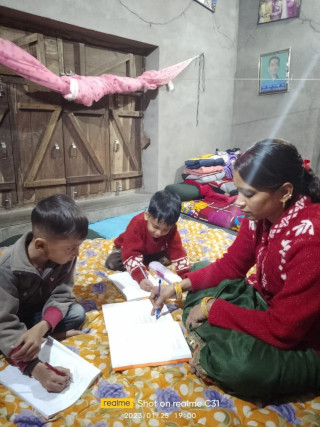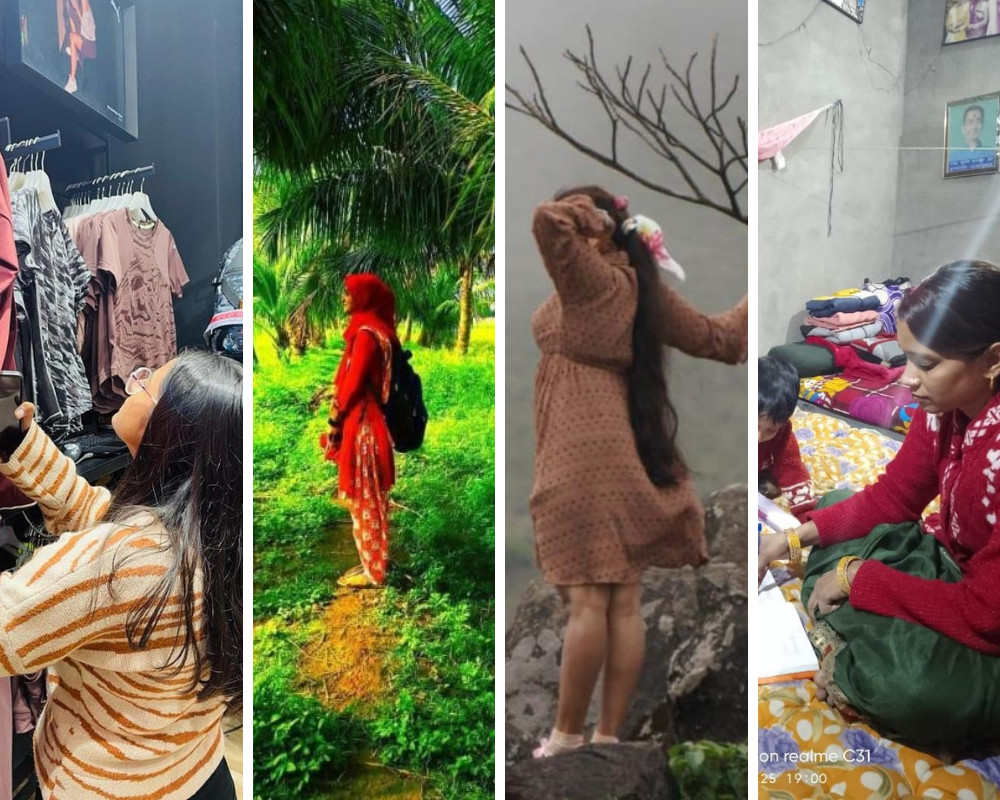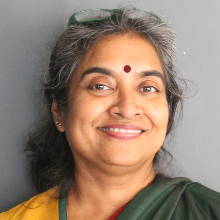By Piyul Mukherjee, Sharmistha Adyanthaya, Mehek Kukreja and Rashi
On the face of it the government and policy thrust on increasing literacy rates amongst women in the last few decades should have naturally transitioned to a growing participation of women in the workforce. In reality the abysmally low figures of 21.6% participation of women in the workforce tell a different story.
The World Bank reports that India’s GDP growth rate would climb above 9% if women had an equitable share of jobs, and that India could boost its growth by 1.5 percentage points per year if just 50% of women could join the workforce.
We deep dive to discover the hurdles that have grounded the future career dreams of four spirited women. Women in different life stages and yet united by a feeling of stoic resignation at a system that facilitated their becoming ‘padhi likhi—only to rudely cut short the career dreams they nurtured and worked to fulfil.
Riya, 22, from the Tier 3 town of Malpura in Rajasthan has a professional degree, yet is stranded in her hometown due to age-old family opposition. Karina Khatun, 23, from the village of Kamarpukur in West Bengal is an M.Sc Mathematics with a GPA of 9.4— a topper from the prestigious Burdwan University. This wizard of chaos theory and fractals has not been approached by any corporate. Preethi, 27, at Dharwad, Karnataka, is acutely aware of having settled for a job that under-utilizes her qualifications of an MSc in Chemistry. And there is Jyoti, in Buxar, Bihar who at 35 has accepted stagnating in a limited teaching role of part-time tuitions at home.
Economic gurus have made the increased participation of women in the workforce as being critical to India achieving the growth target of GDP of $5 trillion by the year 2025 and catapulting to an ambitious $30 trillion economy in the next 25 years.
Our policies have made good on their promise to ensure education for the women in small town India. What should be done next to help transition women completing a college or professional degree to become productively employed?
We note that the critical juncture where intervention is required, is at the nodal stage of life where a woman completes her college degree. Some need to convince their parents to pursue a career even while the family seeks a suitable matrimonial match. While there are others away from the cities who are extremely capable but are never approached. Any ‘gap’ at this stage becomes insurmountable, and women appear to fall off the graph.
Governments, both central and at the state level, are committed towards women’s education. Perhaps, the need of the hour is to handhold women for a tad longer. That first year post the completion of education is when she requires all the support. To remain gainfully employed for life.
MS Dhoni was not discovered in Mumbai’s Shivaji Park or Delhi’s Feroz Shah Kotla Stadium. It was only when BCCI stepped out, did they come upon Dhoni at far flung Ranchi.
Quite obviously, all the postulates that there are enough and more job opportunities that lack gender bias, are not enough. Is the corporate world really reaching out?
The Tech-Employability 2021-22 report focussing primarily on Tier- II cities cites that women are more employable in tech development jobs than men. Ironically it goes on to state that there is obvious under-utilisation of women's talent in the tech industry rooted in women often being treated as a 'reserve workforce' rather than an intrinsic part of the economy.
“I did a B.Sc. in fashion designing to work in the fashion industry, not to be a tailor at Puja Fancy Store”

Riya Jaiswal*, age 22 years
Residence: Malpura (population 27,000), Tonk District, Rajasthan
Education: B.Sc. Fashion Design from IIS, Jaipur
Occupation: Waiting for the right opportunity
Family: Lives with her parents and siblings in Malpura. Father works at a bank.
*Name changed to protect identity
Riya fought tooth and nail to fulfil her career dreams. Having gained admission to do a B.Sc. in fashion designing from the IIS university in Jaipur, she convinced her family to send her 100 km from home to study while staying in a PG. No mean feat when most girls in Malpura study at the local Lakshmibai Girls College in Sadarpura, a mere 5 km from her home. “There are some families, where the parents are narrow minded and the children give in, but I’m different. I had to reason with my father and fight for permission to leave home and study in Jaipur.''
Life was certainly not easy. With the PG accommodation costing Rs 5,000, and taking away a sizable chunk of the money that her father provided, Riya learned to make do with Rs 2,000 for food and utilities.
Instead of going home on weekends and holidays, she explored Jaipur on her own. “There were many weekends when I would eat something light. I would tell my family at home that I have project submissions and assignments so I didn’t have to go back. And I used the money I saved to explore Jaipur.”
When the Covid surge happened, Riya had to perforce return home and attend online classes. She bitterly missed her independence and freedom back in Jaipur. Finally graduating in 2021, she never got the chance to return to Jaipur.
Her dad has since refused to allow her to go back to Jaipur to work, stonewalling her with “of course you can work. As long as it is in and around here.”
She feels like a bird in a gilded cage at home. With no opportunities to work locally, she feels helpless and frustrated yet is not willing to settle for less. “What can I do here? Here one can either work at a beauty parlour, run cooking classes, do some small tailoring jobs or be a clerk at a local office. I will not be able to earn more than Rs 10,000 - Rs 12,000 a month. There are no jobs for us to productively use our educational capabilities.”
When she received an offer to start as a junior trainee at one of Jaipur’s numerous export houses, at a salary of Rs 7,500, her father said “Beta, itne paise toh mujh se hi le lo aur ghar baitho!” What is the need to go away from home for this little amount of money, you stay at home and I will give it to you.
When she expresses her resentment about her cousin Devanshi being allowed by her parents to work in Jaipur after graduating from the same institute as her, her father pacifies her with “Hoda hodi mat karo!” Do not get so restless and impatient. “What is the need to work now, you can work after you get married, if your husband’s family is okay with it.”
She is not willing to take that chance, well aware of the double standards prevalent “Men today seek educated brides who have completed their graduation but still don’t want women who work in full time jobs, fearing their wife would become too independent. At the same time, they also don’t want a housewife.”
Her frustration at a missed opportunity is evident in her words: “I would have loved to have the work exposure in Jaipur. Until a girl has the experience, her education feels like a waste of time and money. If I continue in Malpura, my level will only reduce, not increase,” she rants. “What sense does my education make now?”
For Riya, the gap she had to take after college has now turned into an indefinite break with no hope in sight. “You know, if only I had the chance to stay back in Jaipur, I know I would have still been working today and my life would have been so different from what it is now.”
Her confidence shaken, she is now toying with the idea of taking her father up on his offer to help her monetarily in setting up her own business. “I want to show my parents that I can make use of my education. I think I will take the Rs 7,500 my dad is offering every month and start my fashion designing showroom. But let’s see…”
“I am a college topper yes, but no one has approached me for potential jobs”

Karina Khatun*, age 23 years
Residence: Garh-Mandaran village (population - 4000), Kamarpukur, West Bengal
Education: M.Sc Applied Mathematics (G.P.A: 9.4/10) from University of Burdwan
Occupation: Clueless about job opportunities. Karina is preparing for all sorts of entrance examinations indiscriminately.
Family: Lives with her parents and younger brother who is also a brilliant student. Father is a daily wage earner. Garnering fees for both siblings has always been difficult.
*Name changed to protect identity
Karina considers ‘Advanced Optimization’ to be her weak subject. She scored 7.5 out of 10 in it, you see, and this brought down her SGPA to 9 in the final semester of completing M.Sc in Applied Mathematics last year.
In all other subjects—chaos and fractals, magneto-hydrodynamics, boundary layer theory—she scored a perfect 10.
Right now, Karina is running pillar to past, attempting all sorts of banking and government entrance examinations. The ‘prelims’ to SBI is cleared, she awaits details of when she can appear for the ‘mains’ exams.
She even applied to the West Bengal Primary Teachers examination, where Karina qualified. She knows this because the answer key was published in the newspapers, as part of a governmental transparency drive.
However, in the absence of a B.Ed degree, other candidates with lower scores have now got a permanent job.
And yes, she is studying for her B.Ed. In 2025, when she will complete the B.Ed, she is not sure whether she would have to appear yet again for the Primary Teachers examination.
Ideally, Karina would love to have a career that utilizes all of her complex analytical ability. ”I love anything with numbers and related concepts. But I don’t know where to apply.” She is a tad uncertain about her spoken English ability and expects she can master it quickly.
Her family believes Karina should settle for a teaching job.
“When I was in Uccho Madhyamik (XIIth std), my earlier village school headmistress called me to meet her,” recalls Karina. “Krishna di (the headmistress) was desperate. The mathematics teacher had gone on long leave for weeks, there was no temporary replacement available.”
The school adjusted the arithmetic classes of standards seven to ten to suit Karina’s college timings, and she came in to teach each morning.
“The first day I was rather surprised and puzzled at the reception the students gave me,” says Karina. “Each class of girls came and surrounded me, wanting to touch me.”
The reason? Karina Khatun’s large photograph was on proud display in the school assembly hall, as an all-time topper. Her teachers spoke of her often in class as a stellar example and each student felt they knew her already.
Two months later, when the usual math teacher was back, the girls surrounded Karina once again. In tears this time.
Not tied down by systems and rules, Karina had taken it upon herself to teach the subject till every last child in each class understood the base underlying concepts. Without any homework to be completed and no scolding either.
While teaching scalars and vectors for instance, Karina had asked each child to come back with any live example of a measured number. It fired their imagination, and they came back with examples of distance, body temperature, weight of potatoes, height of a child, airplane flying at a height. The class then discussed if the figure had a direction or not to be a vector. Or was it just a scalar?
As Karina pores over one more entrance examination announcement, she avers that she can get a job as a schoolteacher in any of the mushrooming non-governmental private schools. At a salary of Rs 11,000 working double shifts.
For a family striving to make ends meet, she is aware that this would be a welcome infusion of funds.
But she wants to know, “I feel that with my understanding of applied mathematics, I can do much, much more in life. Don’t you?”
“With my qualifications I should be in Silicon Valley instead of stagnating in a teaching job”

Preethi Hegde*, age 27 years
Residence: Hubli (population - 13,00,000), Karnataka
Education: B.Sc (J.S.S. Banashankari Arts, Commerce & S.K. Gubbi Science College); M.Sc - Chemistry (Karnatak Arts College Dharwad); B.Ed (J.S.S. Sri Manjunatheshwara College of Education, Vidyagiri, Dharwad)
Occupation: College lecturer
Family: Lives with her husband and in-laws in Hubli. Husband is an engineer in a non-transferable job
*Name changed to protect identity
Preethi fulfilled her educational goals with the support of her father. A bright and diligent student, she consistently scored good grades in her B.Sc, M.Sc and B.Ed exams. While it made her father proud, it failed to convince him to send his precious daughter away to take up a lucrative private sector job she had set her heart on.
Simply not determined enough to battle with her otherwise supportive father, she settled for a teaching job in a college. It is obvious that giving in still rankles. “When we had campus placements in college, I had an amazing opportunity with Wipro in Bangalore. I cleared the first two rounds of interviews, but my father was adamant about not letting me move to another city. I am the eldest and did not want to hurt him, so I did not appear for the final interview.”
She wistfully contemplates what her life and future could have been had she been allowed to follow her heart. “My best friend, Mridhula, was in the same class as me in Oriental PU. You know, I was the best in class, but now she is working in the United States and making so much money. That could very well have been me!” She believes her current job will never get close to fulfilling her career ambitions. “Today I make only Rs 22,000 a month after three years, two promotions and no leaves.”
She is now slowly accepting that it’s difficult to change her career trajectory at this point of time, even more so after marriage and the responsibility it has come with. “If a new job opportunity comes outside Hubli, I really cannot move now. This job gives me a longer maternity leave so my in-laws want me to stay here. I’m not at my mother’s home anymore, no?”
While grudgingly accepting the choices she had to make she is hopeful that things will be different for her academically brilliant younger sister Riddhima. “My father has now seen his friends’ and relatives’ kids go outside and work over the past couple of years. They’re doing well for themselves, so now he is more open to opportunities outside Hubli.”
She believes her sister has the advantage of the allowances parents typically make for a second child. “My father had far more strict rules for me. My sister is also from a totally different generation and I’m sure she will not give in as easily as I did.”
Preethi is aware that she is highly qualified, yet underemployed. She can’t but help look over her shoulder at missed opportunities. “I could have and should have been living my dream today. I wonder how life would have panned out if I had been a little stronger and pushed back.”
“With my education I could be earning double of what I get through home tuitions”

Jyoti Gupta, age 35 years
Residence: Buxar town, Bihar
Education: Bachelors in History Honours from MV College, Buxar
Occupation: Home tutor
Family: Lives with her husband who is a shop assistant, and two young children
Jyoti believes she was born to be a teacher. At the same time, she believes her degree in history was worth only as much as getting a decent husband in the marriage market. “Grooms continue to ask for a padhi-likhi ladki [educated girl] so that they can contribute to the household when needed,” she shrugs. “But why do grooms ask for an educated girl when women are not allowed to work?” she wonders.
In Buxar the only career options for women is to work as beauticians, home tutors or do tailoring. Jyoti chose to stick to her love for teaching. “Teaching I believe is rooted in mutual learning. I learn so much while teaching my students.”
For now, her purported teaching ambition is limited to tuitions for children studying in primary grades, that she conducts in a group on weekdays for two hours at home. After dedicating nearly 40 hours every month, teaching children in groups of three or four at a time, her per month earnings add up to ‘mushkil se’ [barely] Rs 10,000. “Parents do not want to pay more than a few hundred rupees for a bunch of subjects per month of daily tuitions.”
She is proud that she is able to provide for the family in her own small way. “Accha lagta hai jab mere bache mujhse kuch maangte aur mein unhe de paun.” I like it when I am able to give my children some small indulgences.
She is well-aware of the limitations of home tuitions. “No matter how many extra hours I am willing to give, home tuition will never pay much—yaha kaudiyon ke bhav se padhane wale milte hai.” There are more than enough tutors available on demand.
Jyoti is rather scornful about the attractive stipends from the government to encourage parents to educate their daughters. “Parents want to teach their girls as they get Rs 20,000 – Rs 30,000 when they pass 10th or even get laptops when they get a distinction.” But she questions the intent. “Buxar mein unke layak koi naukri milni mushkil hogi. Padhai karne ke baad kya karenge?” In Buxar, how will educated girls find a job that will match their qualifications?
Much as Jyoti believes that her qualifications could have landed her a better teaching job, she has made peace with the fact that in Buxar, home tuitions are her only chance at earning while balancing her household responsibilities.
Could she have achieved more? Jyoti has quickly mastered the e-retail ecosystem. She regularly browses on various e-shopping platforms for bargains “When I am looking for something I scroll through shopping apps like Flipkart, Amazon and Meesho to check available items and compare their prices.”
With a sense of pride she shares her expertise that has made others in the neighbourhood come to her for help. “Once I had ordered a gown and did not like it. I went on the return option, wrote in my query and submitted it for return. I was thrilled when the whole process was completed in two days.”
“Aas pass ke log bhi aake mujhse help lete hai online samaan khareedne ke liye.” I assist people in my neighbourhood to shop online and with any issues they face.
With a plethora of backroom online jobs, perhaps all that is needed is some basic training to make a career in online education or logistics a possibility for women like Jyoti.
Naysayers may be right to argue that turning the tide for a 35-year-old well ensconced in her choices will prove challenging.
Focussing on the cohort of those below the median age group of 26 to 27-year-old women, fresh off the ‘educated’ boat and actively engaged in seeking career opportunities may be far easier and feasible. All it needs is an actionable nudge from policymakers and the corporate world.


